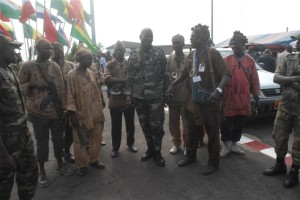Following the 2010 presidential elections, Côte d’Ivoire slipped into a deep political crisis as a result of the election outcomes. After the first round of votes yielded inconclusive results, a second round of voting was held between candidates Laurent Gbagbo and Alassane Ouattara. The predominantly Christian south aligned with Laurent Gbagbo, a member of the Bété tribe, and much of the Muslim north aligned with Muslim candidate, Alassane Ouattara, a member of the Dioula tribe. Alassane won the second vote, but former president, Laurent Gbagbo, refused to step down. As a result, political violence erupted, ethnic tensions ruled, and a space was created for the Dozo, a hunting brotherhood, to become a power-weilding, quasi police force.
The Dozo are, traditionally, an ancient hunting brotherhood, rooted primarily West African countries. Currently though, the brotherhood occupies a unique position in the indeterminate sphere between militant groups and the Ivorian military. In Côte d’Ivoire, the Dozo back the Ouattara regime; in a unique manifestation of their support, the group has adopted the role of a quasi-military entity. Armed with AK-47s, members have been implicated in road blocks, security checks, arbitrary arrests, and killings. While the Dozo have denied these accusations, pointing to the strict moral code members adhere to that would forbid them to engage in such acts, there appears to be a general understanding that the Dozo have, in fact, been involved in the crisis in this capacity. Côte d’Ivoire has attempted to quell this internal threat to stability by passing cabinet resolutions that forbid Dozo members from bearing arms, and call them to cease roadblocks and security checks, but these attempts by the government have been fairly futile, thus far. These resolutions may not be considered entirely credible, as this regime has acknowledged the Dozo as influential in moving Côte d’Ivoire towards progress and the Ouattara regime. Undoubtedly, the government has created a situation that seems to be simultaneously affirming the Dozo, while trying to quell the instability and security threat the group causes.
Ultimately, Côte d’Ivoire will have to address the Dozo and the role the group has assumed in a way that publically condemns the human rights abuses the Dozo have been charged with. Otherwise, it will be unlikely that the Côte d’Ivoirian people will be able to move forward from this conflict.
For more information, please visit:
Geo Currents- Ethnic Dimensions of the Conflict in Ivory Coast-28 April 2011
IRIN- Ivoirian Hunters Accused of Abuses- 14 January 2014
The Eagle- The Harp Is the Hunter’s Qur’an: Text, Performance, and Narrative in Dozo Hunting Songs of Northwest- 24 February 2014
TV/C News- UN wants to end impunity for Ivory Coast’s “Dozo Killers”- 7 June 2014
